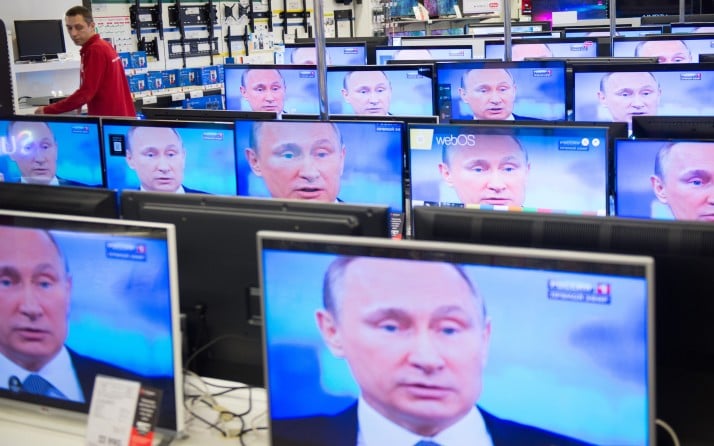
To counter Kremlin crackdown, the BBC aims for a TV channel to promote “democracy and liberty.”
The BBC said Monday it wants to set up a Russian-language TV channel to promote “democracy and liberty” and counteract the Kremlin’s crackdown on domestic media. The broadcaster will also use Internet platforms, such as YouTube, and supply news bulletins to channels in Russia’s neighbors.
The planned expansion, five years after the BBC stopped Russian radio broadcasts because of small audiences, is partly an attempt by the corporation to highlight its value to the U.K. government, which is reviewing its operations and funding.
“This reinvestment reflects a more aggressive media strategy by [Russian President Vladimir] Putin,” said Richard Sambrook, a former head of global news at the BBC, now a professor of journalism at Cardiff University. “There is a growing view that the West needs to do more to counteract Russian propaganda.”
The BBC’s expansion of its Russian-language broadcasts comes nine months after Germany’s government-funded international broadcaster, Deutsche Welle, received €3.5 million for additional Russian content.
Deutsche Welle used the cash to build on existing Russian- and Ukrainian-language programing and web content. The Russian-language newsroom now operates around the clock and staffing has been expanded in Kiev, Ukraine.
“Our objective is to deliver accurate and trustworthy news in Russian and Ukrainian,” said Ingo Mannteufel, the editor-in-chief of Deutsche Welle’s Russian service. “And in a crisis, the interest in the work we do goes up.”
Mannteufel said the number of viewers of Deutsche Welle’s Russian-language services are hard to estimate, particularly in the former Soviet satellite states where DW programming is re-broadcast by partner stations.
However, Deutsche Welle’s online Russian-language content attracts three million visitors a month to the main website, and that figure can triple during times of crisis.
Half of Deutsche Welle’s audience are in Russia, while the other half are Russian-speakers in Baltic states, eastern European countries, Israel and Germany.
However, a former deputy foreign minister of Poland, Jerzy Pomianowski, said that whatever the merit of Deutsche Welle and BBC current affairs programming, these services are losing the battle for the hearts and minds of Russian-speaking viewers.
“Their capacity to reach audiences in the region is between 2 to 3 percent, or even less,” said Pomianowski, now the executive director of the European Endowment for Democracy, an EU-funded think-tank in Brussels.
“Why have they not been able to attract bigger audiences until now?” Pomianowski asked. “It is not because of a lack of professionalism or funding and it is not about the brand — all of them are well regarded international broadcasters.”
The answer, according to the European Endowment, is that Moscow is giving viewers better news and current affairs programs.
The European Endowment is spearheading a push by Poland and the Netherlands to create a Russian-language production center in Europe, with the backing of international donors. The think tank completed a feasibility study into how best to respond to Russian media propaganda. It concluded that news alone would do little to attract audiences.
“International broadcasters are not presenting an offer that is attractive enough to those viewers,” he said. “[Audiences] are looking for soap-operas which reflect their reality; they are looking for the talk show, the reality show, that are based on different emotions.”
Pomianowski will meet officials from EU and other donor countries in Warsaw on Thursday to discuss ways of implementing the recommendations from the feasibility study.
Deutsche Welle appears ready to consider some level of pan-European, Russian-language broadcasting collaboration, but says the decision would have to come from the German government.
“We are very open to any kind of synergy and do not favor a doubling-up of institutions,” Deutsche Welle’s Mannteufel said. “But the real problem for all independent [Western and Russian] media is how to reach broader segments of the people in Russia who have been systematically misinformed by the state-controlled Russian media.”
The BBC’s Russian plans were among several initiatives outlined by the corporation’s director-general Monday as he sought to make the case against drastic reforms.
New services targeting audiences in countries such as North Korea, Ethiopia, and Nigeria will also be introduced as part of an expansion of the BBC World Service.
Charlie Beckett, a professor of journalism at the London School of Economics, said emphasizing the BBC’s potential contribution in places where there is a deficit of impartial news is a “politically astute” move, but it could backfire if they are seen as boosting services for Russian-speakers while cutting TV and radio services at home.
The World Service expansion would require additional public funding, and would be matched by raising revenues from commercial sources such as advertising and sponsorship, the BBC said.
By James Panichi and Alex Spence, Politico





